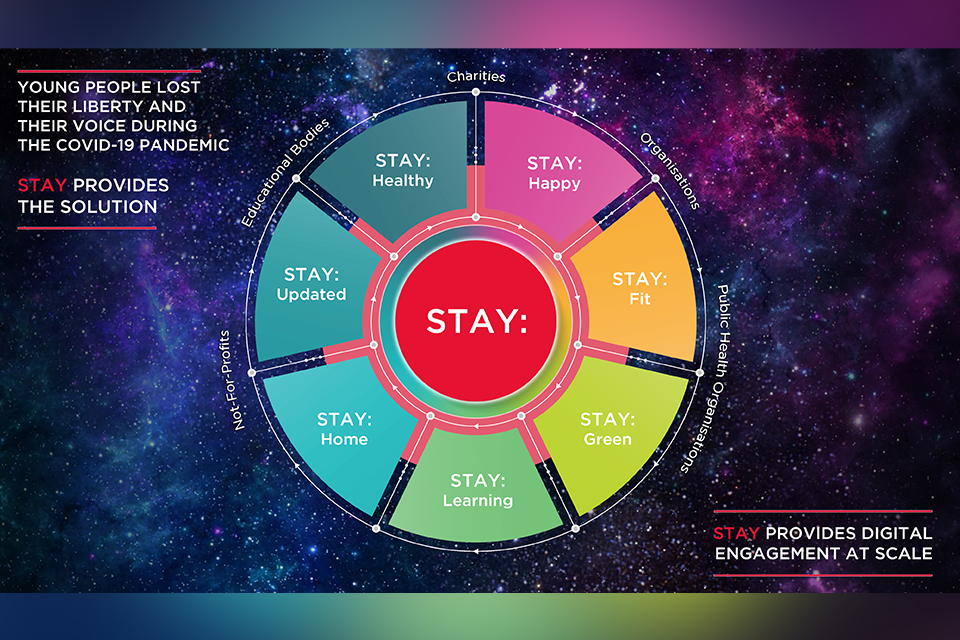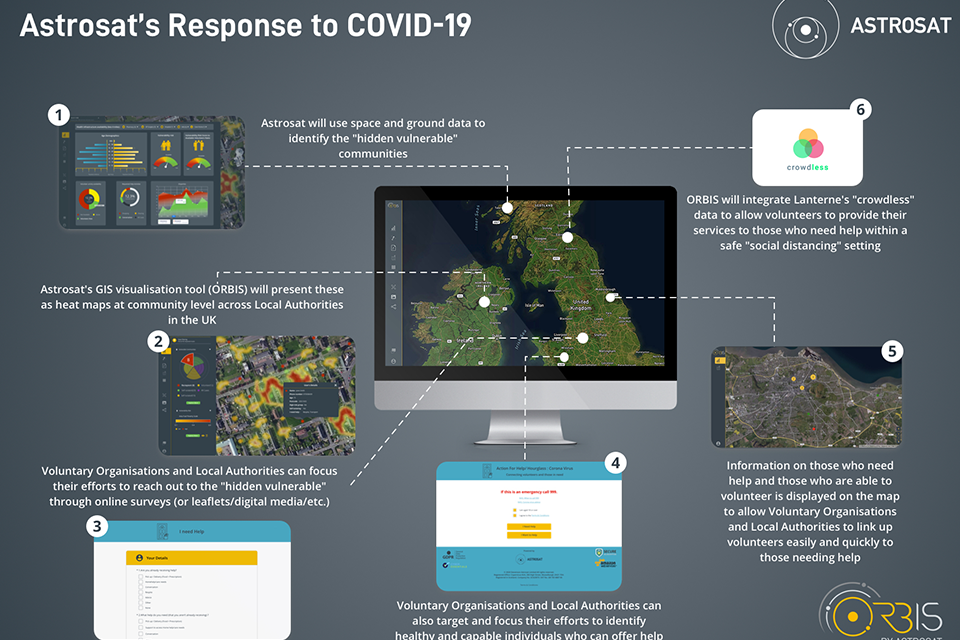Science Minister Amanda Solloway has today (Friday 10 July) unveiled details of the three new projects that have been selected as part of a joint initiative between the UK Space Agency and the European Space Agency (ESA) to find and support space-enabled technologies and services that can support the NHS response to coronavirus.
Space company Skyports will be working with NHS Highland, which serves a group of islands off the west coast of Scotland, to use drones to deliver medical supplies and samples from a hospital on the Argyll and Bute mainland.
Drones will use mobile connectivity, satellite communications and navigation, and Earth observation data, to chart a course to others areas of the mainland and across the sea to nearby islands to reach medical practices in need.
Science Minister Amanda Solloway said:
I'm proud of how our world-leading space sector is stepping up to provide innovative solutions to directly support our amazing NHS, as we continue our national effort to tackling coronavirus.
The projects we are backing today show UK ingenuity at its finest, and will make a real difference to how we use this latest innovative technology to deliver critical healthcare now and long into the future.
The UK space industry has some of the brightest minds in the country and is well placed to support the unprecedented national effort to overcome coronavirus and recover strongly from the global pandemic.
An initial £2.6 million was made available and these first three schemes have received a total of £1.1 million. The UK Space Agency and ESA are still looking to fund further bids with the call for ideas remaining open until 30 September 2020.

Credit: Landmrk
Professor Tony Young, the NHS national clinical lead for innovation, said:
The NHS Long Term Plan is bringing new technologies into the NHS to improve patient care and save lives, and as we deal with the greatest challenge in the NHS' history, innovation in medicine and convenient, faster technology are helping frontline staff to give people world-leading treatment for Covid-19 alongside care for killer conditions including cancer.
The space-enabled solutions include satellite communications, satellite navigation and Earth observation satellites. The UK continues to be a leading member of ESA, which is independent of the EU, having committed a record investment of £374 million per year in November 2019. This funding to support the coronavirus response comes from ESA's Business Applications Space Solutions fund, in which the UK is the leading investor.
Nick Appleyard, Head of Downstream Business Applications at ESA's European Centre for Space Applications and Telecommunications in Oxfordshire, said:
So many people have been so deeply affected by the coronavirus pandemic, in UK and around the world. We are grateful to these companies for quickly stepping forwards with their ideas to relieve pressure at some key points in the NHS' extraordinary moment of challenge. And we are proud that European Space Agency has been able to support them through our long-standing partnership with the UK Space Agency.
We hope that these projects will now inspire even more innovators to make a difference, and we look forwards to receiving their proposals too. Finally, we would like to thank the staff and workers of the NHS for their service.
Transport Minister Rachel Maclean said:
Now more than ever, it's vital that we protect our NHS, which is why it's great to see our world-class space sector leading the way in providing solutions to protect the public and patients.
As we recover from coronavirus, the exciting projects revealed today will use innovative tech to support our national health service, now and in the future.
I'm proud to see such bright and promising British projects receive the backing they deserve from the UK Space Agency.
UK Government Minister for Scotland Iain Stewart said:
It is great news that the UK Space Agency is supporting coronavirus response projects which will benefit Scottish communities.
I welcome the innovative Skyports and NHS Highland scheme to use space-enabled drones to deliver crucial testing and medical supplies from the mainland to islands off the west coast of Scotland.
And I congratulate Musselburgh-based Stevenson Astrosat for securing funding to develop a high-tech solution for targeting support to vulnerable communities.

Credit: Astrosat
The projects in detail:
Space-Enabled Delivery Drones for the COVID Response (SEDDCR)
Skyports, based in London, is working with NHS Highland, which serves a group of islands off the west coast of Scotland, to use drones to deliver medical supplies and samples from a hospital on the Argyll and Bute mainland. Drones will use mobile connectivity, satellite communications and navigation, and Earth observation data, to chart a course to others areas of the mainland and across the sea to nearby islands to reach medical practices in need.
Stay
Landmrk Limited, based in Bristol, will develop an app called Stay, a mobile platform for charities and organisations supporting young people's mental health and wellbeing. Using satellite communications and Earth observation satellites the mobile-interactive app will reward young people for acting positively with 'badges', which will be linked to rewards, discounts or other incentives. Positive behaviour will include exercise, watching an educational video and answering a quiz and following distancing and hygiene guidelines.
Isolation +
Stevenson Astrosat, based in Musselburgh, Scotland, is developing a solution, called Isolation +, which uses advanced space data analytics combined with relevant ground information, to identify "hidden" vulnerable communities. This will allow voluntary organisations and local authorities to target support to those who are exposed to the impacts of Covid-19 through poverty and age.
Space is already playing an important part in healthcare. Last year the UK Space Agency provided £5 million for new health technologies inspired by working in space to support NHS England. These included providing real-time diagnosis of bowel cancer, developing more compact 3D X-ray machines and a mobile app that provided exercise plans free from air pollution for those with medical conditions such as asthma.
Meanwhile the UK Space Agency's International Partnership Programme uses UK expertise to support healthcare projects all over the world, including forecasting and providing early warning of dengue fever outbreaks in Vietnam through Earth observation satellites and using telecommunications to extend the reach of basic medical healthcare into remote areas in Nigeria.
The UK Space Agency and UKspace trade body continue to work closely together to help the space sector respond to and recover from the coronavirus pandemic.
The UK space sector employs 42,000 people and generates an income of £14.8 billion each year, while supporting £300 billion of wider economic activity through other industries with satellite services such as navigation, communications and Earth observation. The government is developing a comprehensive UK Space Strategy to build on this success, strengthen national space capabilities and unleash a wave of further innovation across the country.






